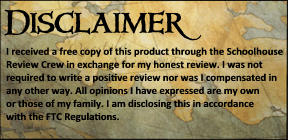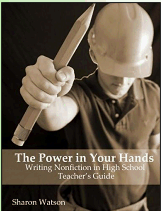![[sharon%2520watson%255B9%255D.jpg]](http://lh3.ggpht.com/-UqYp6zsmtCs/UWYdhL00-vI/AAAAAAAABfo/YCr-1xmy87I/s1600/sharon%252520watson%25255B9%25255D.jpg)
I received Writing with Sharon Watson’s curriculum to review
titled The Power in Your Hands, Writing Nonfiction in High School. I received one text and a Teacher’s Guide. The text retails for $39.98 and the teacher's guide retails for $14.98.
In my three years of homeschooling I’ve used many resources
for teaching writing and have formed an opinion on what I think it takes to
develop good writers. However, I am
always willing to look at another resource to add to my arsenal of writing
tools to help my children become great writers.
I had to first get acquainted with the material by reading
the table of contents and reading the first couple of chapters to get a sense
of how to implement the curriculum with my high schooler. I must admit I had a hard time getting a grip
on the material.
The text is divided
into six parts: Before You Write,
Persuasion, Exposition, Description, Narration, and Reference. Each part covers several topics. Following is what is covered in Part I and
Part II:
Chapter 1 – Planning
Chapter 2 – Opinions
Part II Persuasion
Chapter 3 –
Persuasion Essentials
Chapter 4
- Persuasion-Next Level
Chapter 5
- Persuasion- Logical
Chapter 6 –
Persuasion – Compare/Contrast
Chapter 7
- Persuasion – Moral/Ethical Appeal
Chapter 8 –
Persuasion – Emotional Appeal
Chapter 9 –
Persuasion – The SAT Essay
Chapter 10 –
Proofreading
A closer look into the chapters reveals several things. Each chapter covers a lot of ground. For example, chapter 3 covers all of the
following topics and several other topics:
- the difference between persuasion and opinions
- a practice activity for choosing a topic you feel strongly about
- brainstorm the topic you chose (brainstorming is covered in Part I, Chapter 1)
- a practice exercise of putting the brainstorming ideas in a logical order (logical order is covered in Part I, Chapter 2)
- a third practice exercise asks you to write a purpose statement using the formula explained in the section immediately preceding the exercise.
- a discussion of main ideas and thesis statements
- a practice exercise to identify the thesis statement in an introduction paragraph and answer questions about that same paragraph
- the four things every introduction of a persuasive paper should have including a QSFSQ tool (discussed in Part I chapter 2), the topic, your view, and your thesis statement
- the greek organization tool of organizing a paper
This is only chapter 3 of Part II. However, many of the chapters are laid out in
this manner. I became a little discouraged
because this text is so unlike many texts I’ve worked with before. At this point I decided the text would be a
better fit for my 8th grader not my 10th grader. I had my 8th grade student jump
right in before I could fully grasp the material. The student text is very independent so I
just needed to look over her answers to the practice exercises and let her
continue working from one exercise to the next.
Having my student actually work in the text made me understand the
material more.
My student is using another literature & composition
course and was working on a character essay at the time I introduced her to
the Writing with Sharon Watson program. The first few exercises
on brainstorming, organizing your ideas, and developing a thesis are great
exercises which translated nicely in developing the character essay she was
already working on. Although The Power in Your Hands, Writing Nonfiction in High School is meant to be a
stand alone curriculum, I think it can be used alongside another program like
we are choosing to do. You can never have too much writing
practice.
I’m still on the fence regarding my praise for this
program. I was a little harsh in my
critique before we actually started using it.
Sometimes you just have to go with it to get it. I just have a different way of approaching
writing that conflicts with the layout of Sharon Watson’s curriculum. For example, if I want to focus on writing
good introductions I want to look at a text and see all the introductions for
persuasive writing, narrations, literary analysis, etc. The author covers introductions at different
places within the text so I would have to hunt around to view all the
activities that focused on introductions.
As an improvement, I would include an index to help direct the student
to every place in the text where a lesson on introductions could be found. If I wanted to find a particular skill to
work on and all of the practice exercises related to that topic, being able to
go directly to this content would be helpful.
Because this is a high school text, it may not make sense to
work your way through the text from beginning to end. A lot of high school students have mastered
certain aspects of writing but not all. This
is the reason I started my 8th grader with this text and not my 10th
grader. At this point in my 10th grader's
academic career she needs to strengthen certain skills not relearn them all
over again.
What I liked the most about this curriculum is Part 6, the
Reference section. This section includes
a “Be Your Own Editor” section which reminds students to look at the finer
details of a paper to do a proper editing job.
This section also does a nice job of summarizing the text into nice
bite-sized chunks. It is more a less a
summary of the skills covered that I mentioned I would have liked to see
in the table of contents with page references.
I will continue through the text with my 8th
grader and hopefully in the end have a student
more confident in developing her own ideas. In future blog entries I plan to do updates
on her progress and link them back to this review as a testament of its
effectiveness.
Find out what other TOS crew bloggers thought of Writing with Sharon Watson.
Click to read more reviews from the Schoolhouse Review Crew.


Find out what other TOS crew bloggers thought of Writing with Sharon Watson.
Click to read more reviews from the Schoolhouse Review Crew.




No comments:
Post a Comment